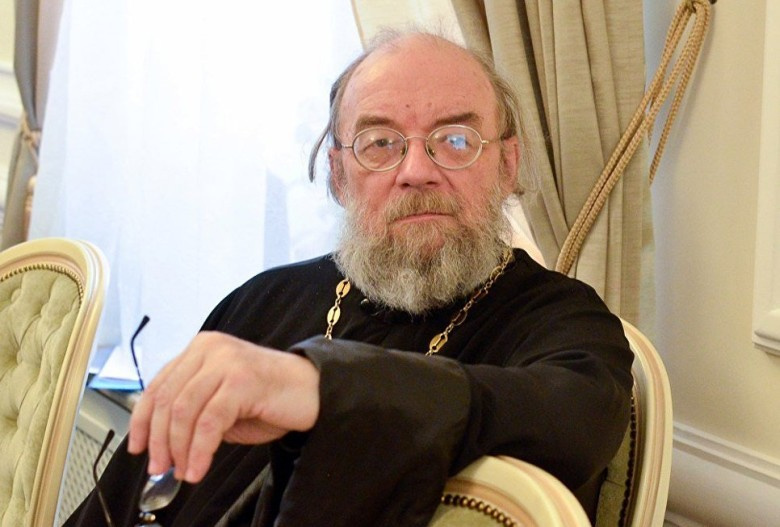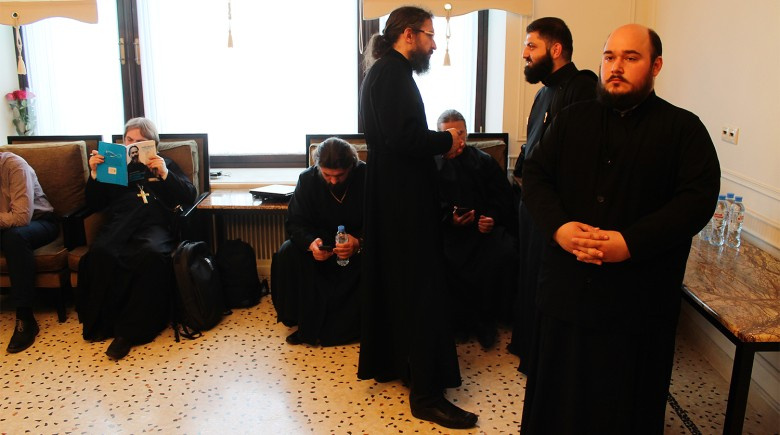 Archpriest Pavel Khondzinsky. Photo: Orthodox St. Tikhon University / Alexander Filippov
Archpriest Pavel Khondzinsky. Photo: Orthodox St. Tikhon University / Alexander FilippovRussian science has reached another milestone. The first Candidate of Theological Sciences appeared in the country. They became Archpriest Pavel Khondzinsky - Dean of the Theological Faculty of St. Tikhon’s Orthodox University, RIA Novosti
reports . The expert prepared a thesis on the topic “Solving the problems of Russian theology of the 18th century in the synthesis of St. Philaret, Metropolitan of Moscow”. Interestingly, as a source of scientific knowledge, the author of the dissent declared his own “experience of the theologian’s faith and life,” that is, personal insights and condescended revelations.
The defense took place in the Church-wide postgraduate and doctoral named after Saints Cyril and Methodius. For the award of a degree voted 21 out of 22 present members of the Joint Dissertation Council on Theology. The dissertation council is headed by a scientist from the Moscow Patriarchate - Metropolitan Hilarion of Volokolamsk.
RIA Novosti notes that the dissertation dissertation received four positive and five negative reviews. According to critics, the author’s scientific method is “based on the personal experience of the faith and life of a theologian,” which is not acceptable.
For example, the head of the Laboratory for Studying Information Processes at the Cellular and Molecular Levels at the Institute for Information Transmission Problems of the Russian Academy of Sciences, Doctor of Biological Sciences Yuri Panchin
wrote in his review the following:
The applicant states that the “scientific-theological method used is constituted by: 1) a specific (unique) subject and source of theological knowledge; 2) the personal experience of the theologian’s faith and life implied; 3) characteristic of all the humanities set of rational operations "... We believe that this approach is contrary to the norms of scientific research, adopted, among other things, by the system of state certification of scientists of the Higher Attestation Commission (HAC). The main thing that we teach students and graduate students in our scientific laboratories is not to take for granted any unverified, unverifiable and unfounded assumptions. We also teach that in science there is no absolute authority and data obtained through insight and revelation ... For us it is important that the use of theologian’s “personal experience of faith and life” discriminates researchers and specialists conducting scientific expertise in state institutions and commissions, who do not have the required experience of faith ...
Is my “personal experience of faith” in Santa Claus in childhood sufficient to comply with this requirement?
(According to the
text translation , during the reading of this review, the words “Grandfather Frost” were used by the attendees to look at each other indignantly.
Philosophers, however, favored such a source of scientific knowledge: “The work (Khondzinsky - ed.) Justifies the closeness of a number of methods that do not belong only to theology, but emphasizes the personal nature of theological knowledge, it cannot be fully rationalized. However, even within the framework of philosophical knowledge, quite a few doctrines are focused on the personal beginning, and besides, it is difficult to imagine a researcher who, in his scientific activity (at least in the humanities), one way or another would not proceed from personal ideological prerequisites - said Alexander Korolkov, Academician of the Russian Academy of Education, Doctor of Philosophy, the official opponent of Archpriest Pavel Khondzinsky. Concerning the above-quoted negative review of Yuri Panchin, he added: “The thesis was written by a qualified specialist. She's philosophical. I do not understand what relation the doctor of biological sciences has to her. Although, as far as I know, Ivan Petrovich Pavlov once did not oppose himself to religion, and Vernadsky was religious. Unfortunately, in our country Orthodox moods are very disliked. We have lived a whole era with this. It is impossible to convince.
He was joined by a colleague-philosopher, Doctor of Philosophy Valery Savrey from Moscow State University: “Negative reviews carry no value. Only those who specialize in the analyzed areas of knowledge can have scientific value. There are five signs of a genuine expert, and biology critics do not match them, ”he said.
None of the authors of critical reviews on the protection was not present. Voting for the award of a scientific degree was positive.
 Defended his thesis in theology within the walls of the Postgraduate and Doctoral Studies named after Cyril and Methodius in the center of Moscow, June 1, 2017. Photo: Pavel Kotlyar / "Gazeta.Ru"
Defended his thesis in theology within the walls of the Postgraduate and Doctoral Studies named after Cyril and Methodius in the center of Moscow, June 1, 2017. Photo: Pavel Kotlyar / "Gazeta.Ru"The defense of Khodzinsky’s doctoral thesis aroused an unusually large public interest. The hall was attended by about 70 people - representatives of the church, academia and the media. At the entrance to the hall
stood a guard . The scientist himself was not very ready for such attention: “You know, I now think that I will never again participate in such an event. A lot of blood is worth it, ”said Pavel Khondzinsky. However, he expressed the hope that in the near future other theological scholars could defend their Ph.D. and doctoral dissertations, who "wrote to the table in Soviet times, thinking that perestroika would come and so much could be published, but this did not happen." Now they have such an opportunity.
In October 2015, the Presidium of the Higher Attestation Commission at the Ministry of Education and Science approved a passport of the scientific specialty "theology". The fundamental difference between theology and religious studies is that the theologian studies religion not from the outside, but from the inside - therefore this is a completely special scientific discipline. An atheist cannot be a PhD in theology, just as a musicologist cannot be a person who has never listened to music (Khondzinsky's argument).
In 2016, dissertation and expert councils were created and the protection of works on theology became possible. The first dissertation council was created on the basis of Moscow State University, the Russian Presidential Academy of National Economy and Public Administration, the General Church postgraduate and doctoral studies and the Orthodox St. Tikhon Humanitarian University.
Representatives of the Muslim community are now expressing their claims, because the protection of works is possible only according to Orthodox theology.